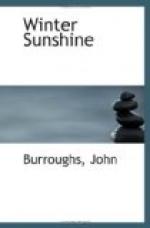The red and gray squirrels do not lay by winter stores; their cheeks are made without pockets, and whatever they transport is carried in the teeth. They are more or less active all winter, but October and November are their festal months. Invade some butternut or hickory-nut grove on a frosty October morning and hear the red squirrel beat the “juba” on a horizontal branch. It is a most lively jig, what the boys call a “regular break-down,” interspersed with squeals and snickers and derisive laughter. The most noticeable peculiarity about the vocal part of it is the fact that it is a kind of duet. In other words, by some ventriloquial tricks, he appears to accompany himself, as if his voice split up, a part forming a low guttural sound, and a part a shrill nasal sound.
The distant bark of the more wary gray squirrel may be heard about the same time. There is a teasing and ironical tone in it also, but the gray squirrel is not the Puck the red is
Insects also go into winter-quarters by or before this time; the bumble-bee, hornet, and wasp. But here only royalty escapes; the queen-mother alone foresees the night of winter coming and the morning of spring beyond. The rest of the tribe try gypsying for a while, but perish in the first frosts. The present October I surprised the queen of the yellow-jackets in the woods looking out a suitable retreat. The royal dame was house-hunting, and, on being disturbed by my inquisitive poking among the leaves, she got up and flew away with a slow, deep hum. Her body was unusually distended, whether with fat or eggs I am unable to say. In September I took down the nest of the black hornet and found several large queens in it, but the workers had all gone. The queens were evidently weathering the first frosts and storms here, and waiting for the Indian summer to go forth and seek a permanent winter abode. If the covers could be taken off the fields and woods at this season, how many interesting facts of natural history would be revealed!—the crickets, ants, bees, reptiles, animals, and, for aught I know, the spiders and flies asleep or getting ready to sleep in their winter dormitories; the fires of life banked up, and burning just enough to keep the spark over till spring.




